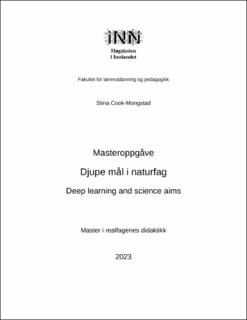Djupe mål i naturfag
Abstract
Djupnelæring er eit tydeleg fokus i norsk skule, synleg i den nye læreplanen, forarbeidet til den nye læreplanen og i forskingslitteraturen. Forståinga av djupnelæring er ulik. Det er også ulikt kva som er rekna som naturfagleg kompetanse, og sentrale deler av naturfaget. Denne oppgåva har som formål å skildre korleis djupnelæring og naturfagleg kompetanse kjem til syne i mål gitt til elevar på mellomtrinnet i naturfag. Informasjon om metodane som er nytta er også samla for å undersøke om måla og metodane samsvarer.Funna syner at lærarane i stor grad fokuserer på naturfagleg kunnskap og nytter mål med svært spesifikt innhald som gjev avgrensa potensial for djupnelæring og naturfagleg kompetanse. Det er eksempel på kompetansemål blant lærarane sine mål og desse har stort potensiale for djupnelæring. Også nokre av mål som ikkje er kompetansemål syner potensiale for djupnelæring. Fleire forutsetningar for djupnelæring er synleg i måla, slik som til dømes å bruke tid og å fokusere på omgrepslæring. Fleire av metodane nyttar ferdigheiter som ikkje er fokusert på i måla, slik som til dømes samhandling. Deeper learning is a clear focus in the Norwegian education system, visible in the new curriculum, the debate leading up to the new curriculum and in educational research. The understanding of deeper learning differs. It also varies what is counted to be scientific competencies and big ideas in science. This study aims to describe in which way the focus on deeper learning and scientific competences are visible in learning aims given to science students 10-13 years old. To see if the methods the teachers choose to use supports the learning aim, methods are also included in the study. The findings show that the teachers mainly focus on scientific knowledge and that the learning aims often state specific knowledge. These learning aims have a low potential for deeper learning and for developing scientific competencies. There are learning aims that focus on competencies and these show a large potential for deeper learning. Some of the other aims also includes, in different ways, potential for deeper learning. It is also found that the teachers aims include different conditions for deeper learning such as focusing on a topic for a longer period of time and focusing on learning scientific terms. The methods used for teaching often include skills that are not stated in the aims. One example is cooperation.
